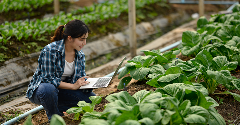News
VTT: structure influences nutritional properties of cereal foods
26 Jun 2018In her dissertation, a research scientist at VTT Technical Research Centre of Finland, explored the impact of cereal food structure on the first steps of digestion and on postprandial satiety.

In her dissertation, Master of Health Sciences Saara Pentikäinen, a research scientist at VTT Technical Research Centre of Finland, explored the impact of cereal food structure on the first steps of digestion and on postprandial satiety. She studied how breads with different structures disintegrate in mastication, what kind of compounds dissolve from the bread matrices to saliva, and how the cereal food structure influences postprandial satiety.
Pentikäinen observed that rye breads disintegrated into smaller particles than wheat breads in mastication. However, due to the influence of salivary amylase, the starch in rye bread tended to hydrolyse at a slower rate than starch from wheat bread. The study gave new information on the compounds that were dissolved to saliva already in mastication. Specifically, peptides and amino acids were dissolved from rye breads and sugars from wheat bread.The research used non-targeted metabolomics analysis to explore the dissolution of compounds from food to saliva. Compounds dissolved from food in the early steps of digestions are said to be interesting as they may have an influence on the postprandial blood glucose responses or satiety.Among rye products with different structures and similar chemical compositions, more porous products − wholemeal rye bread or extruded wholemeal rye puffs − consumed with juice were more effective than extruded wholemeal rye flakes with a denser structure and juice to maintain some aspects of satiety. The intensity of oral processing due to structural differences between the foods did not relate to satiety response, whereas the perceived pleasantness and expectations about the satiating capacity of food did affect the feeling of postprandial satiety. The consistency of the chyme in the stomach also probably contributed to the evocation of the feeling of satiety.In other words, the impacts of the structure of cereal foods on satiety are transmitted through both sensory perception and physiological processes. These aspects, the author believes, should be taken into account when developing pleasant and healthy food products.In the Finnish diet, cereal foods account for approximately one third of the total energy intake and almost half of the intake of digestible carbohydrates. Cereal foods are a significant source of dietary fibre and protein, vitamins and minerals. Wholegrain cereals, which contain all parts of a grain − bran, endosperm and germ − in their original proportions, is rich in nutrition.A diet with large amounts of wholegrain cereals and dietary fibre is associated with lower risk of cardiovascular disease, type 2 diabetes and cancer.Not only composition, but also the structure of food affects its nutritional properties. For example, the carbohydrates of porous wheat hydrolyse much faster in digestion than the carbohydrates of dense pasta, causing a rapid jump in the blood glucose level. Porridge with whole rye kernels is more effective than rye porridge with milled kernels to maintain satiety.Related news

Digital platform can help optimise the protein quality of plant-based meals
29 Dec 2025
Researchers at Wageningen University have developed a metric to assess – and optimise – the protein quality of plant-based meals.
Read more
Debate over ban on ‘meaty’ names for plant-based products reaches stalemate
26 Dec 2025
The debate over a ban on plant-based products using “meaty” terms has reached a stalemate, leaving manufacturers in limbo and still facing overhauls to their marketing and packaging.
Read more
Our most-read articles of 2025
23 Dec 2025
From trade tariffs to heavy metals in protein, we look back at some of the industry’s highlights of 2025 and round up our most-read stories of the year.
Read more
Bigging up bean-based products and consumption in Britain
19 Dec 2025
Non-profit organisation the Food Foundation has launched a campaign, “Bang in Some Beans”, designed to increase UK consumers’ legume consumption.
Read more
Pioneers of circular plastic packaging push for new policies
18 Dec 2025
Some of the world’s largest food and drink companies have grown frustrated at investing in circular packaging systems, as the majority “wait on the sidelines”.
Read more
Which sustainability-related labels are consumers willing to pay a premium for?
10 Dec 2025
Products with animal welfare and geographic origin labels elicit a higher willingness to pay a premium than those with carbon-related labels, research suggests.
Read more
Sorghum emerges as better-for-you hero ingredient
9 Dec 2025
With the launch of Novak Djokovic’s sorghum-based brand, the grain’s popularity in the better-for-you snacking sphere is on the rise, thanks to its nutritional and sensory properties.
Read more
Innovation promise in 'maturing' plant-based dairy alternatives market
8 Dec 2025
Plant-based dairy is a maturing market that still faces significant hurdles around taste, functionality, nutrition, and price, but industry is innovating fast, according to experts speaking at Fi Europe.
Read more
Celebrating the winners of the Fi Europe Innovation Awards 2025
3 Dec 2025
Food industry stakeholders celebrated as the winners of the Fi Europe Innovation Awards were announced at a ceremony in Paris.
Read more
Yuka’s food scanning app helps consumers make healthier choices
2 Dec 2025
Global food scanning app Yuka helps consumers understand the content of their shopping baskets and shapes producers’ reformulation plans.
Read more